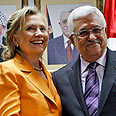

More than 60% of the Palestinian Authority's Gross National Product comes from the United States, European Union, United Nations, World Bank and others countries, according to a study conducted by economic analyst Eyal Ofer in cooperation with President of Financial Immunities consulting firm Adam Roiter.
According to the study's findings, during 2009 and 2010 the PA's reliance on donations increased – with a 20% growth in donations, totaling some $3.96 per year.
The research, similarly to OECD reports, points to the PA's steadily increasing dependence on donation funds. In fact, the Palestinian people receive the largest amount of donations worldwide.
For every Palestinian citizen, the PA receives an average of $1,000 per annum, which amounts to an average of ILS 2,000 (about $560) per family, per month. The data reinforces the claim that there is no Palestinian economy, and that in reality is almost exclusively supported by the donation industry.
Yes, an economy can be built from donations – if these are allocated for development, production and infrastructure, but this is not the case.
"The donations toward the entrenchment of government institutions instead of the development of infrastructure, industry, human capital etc'," explained Roiter. "What we have here is a schnorrer country, without which it does not exist," he added.
Ofer and Roiter noted that since 2000 – when the rate of donations reflected 10.47% of total GNP – there has been a steady increase in the scope of foreign donations. The most significant boost began in 2007, immediately after Hamas gained control of the Gaza Strip, and following the PA's claim that it needed more funds to establish its regime.
'No industrial sector'
Palestinian Prime Minister Salam Fayyad's links with the International Monetary Fund, as well as his "Western" rhetoric vis-à-vis transparency, the building of government institutions and preventing market monopolies have helped him with the task of fundraising.However, according to the study, the facts on the ground indicate that the governmental apparatus and international aid organizations impede the growth of the business sector, while donations are used to preserve the ruling party rather than build a separate economy that is not dependent on foreign donations.
Ofer and Roiter are not the only ones pointing to the worrying trend. A piercing article published in UK-based the Guardian newspaper last November claimed that NGOs have become synonyms with corruption and incompetence, hinting at international donors who the paper claimed thwarted the Palestinian economic development by overinflating the aid industry without supplying long-term solutions.
The latest study reinforces this claim, pointing to the absence of an industrial sector in the Palestinian Authority. "Employers lack the ability or the will to go into industry or development, because they cannot compete with the salaries of governmental organs and that of the aid workers on the ground," said Ofer, adding, "In reality, their economy is solely based on the trade of services."
Even grants that are specifically designated for "projects" throughout the Palestinian Authority are only partially used for their original purpose, claimed Ofer.
According to Roiter, although it is in Israel's interest to see the PA reinforced rather than the Hamas – the Authority's conduct may be dangerous in the long run: "Without the donations, the Palestinian Authority's economy will collapse, and this by turn will affect the security of Israel's residents.
"The funds go into the pockets of bureaucratic echelons and to the monstrous administrative apparatus that mostly deals with allocation of funds and fundraising," he added.
"Governmental services operate on the expense of the business sector, which is left at a standstill – instead of developing alongside it," he noted.
The study also reveals that while the Palestinian prime minister brags in front of foreign institutions over the scope of tax collection in the PA, he forgets to mention that 77% of all taxes are collected by the Israeli Finance Ministry as part of a joint agreement between Israel and the PA. The former then transfers the latter more than NIS 5 billion (about $1.4 billion) per year, which amounts to approximately a third of the PA's annual budget.
The authors conclude their study with a grim prospect – the Palestinian Authority's financial and political interest is compatible with that of Israel – a complete standstill with a false display of "progress."
"The PA may create a false display of assuming responsibility, but does nothing to prevent a possible scenario of economic collapse, because it is easier to live on someone else's expense," they conclude.
- Follow Ynetnews on Facebook















